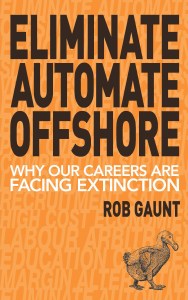What does the future of work really look like? Management consultant Rob Gaunt has some bad new for those looking forward to a future of leisure.
In his book Eliminate, Automate, Offshore; Gaunt looks at how the modern workplace is changing and the priorities of managements and boards in a competitive, globalised world.
Gaunt, who describes himself as a ‘corporate axe man’ warns the reader “you may not approve or like what I do, but that doesn’t mean it isn’t going to happen.”
To start the book, Gaunt gives a potted history of automation in the workforce and how processes can be improved by better management and new technology. He cites his local council garbage collection service which not so long ago would have required eight or nine workers per truck now only needing two.
This trend is coming to the rest of the workforce, Gaunt warns, adding that many of those jobs that can’t be automated can be outsourced.
“When I walk into an open plan office, I look and listen to the activity; if the overwhelming noise is of keyboard strokes rather than human voices, it’s a good clue that much of the functions being performed aren’t location dependent.”
Gaunt goes on to describe how effective outsourcing works with an emphasis on the client having to document their processes before shifting functions or departments to outside contractors as well as the importance of properly scoping and understanding an agreement.
Towards the end of the book, Gaunt examines what roles are likely to survive in higher cost economies along with the skills today’s children are going to need if they are going to avoid being ‘digital roadkill’ in an automated society.
Overall the book is a good read to understand the direction of today’s workforce and the factors driving it. It isn’t a pretty tale.
If anything; Eliminate, Automate, Offshore may be somewhat optimistic about the effects on the skilled trades, professional and managerial sectors as Gaunt probably underestimates how robotics and artificial intelligence are advancing.
Should you read the book, you may want to give your kids – and their teachers – a good talking too. The axe man is ruthless and he’s coming for many of our jobs.

Leave a Reply